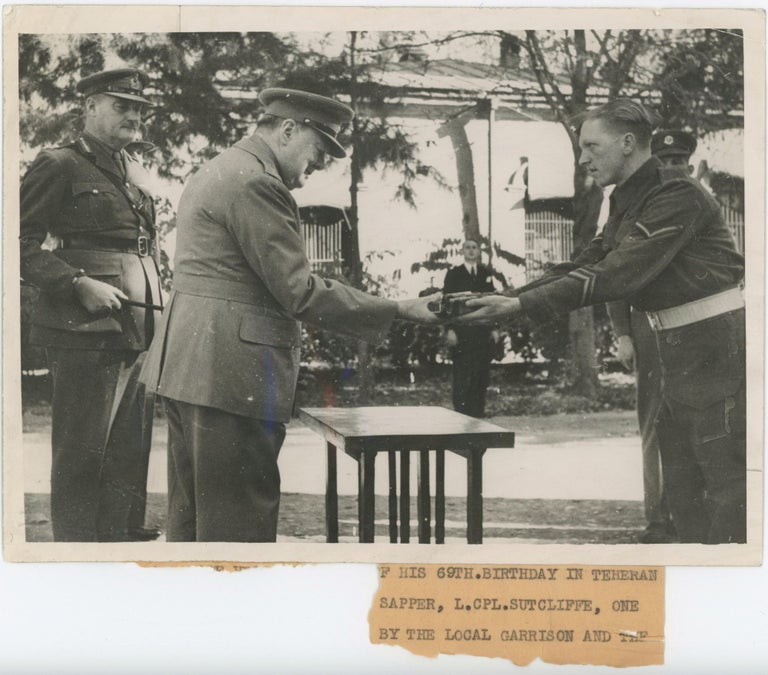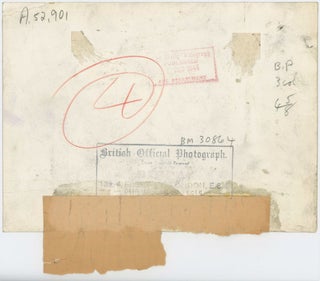A British Official wartime press photograph of Prime Minister Winston S. Churchill receiving a gift from a British soldier during the Tehran Conference with Stalin and Roosevelt on 30 November 1943, Churchill's 69th birthday
London: British Official Photograph, Crown Copyright Reserved, published by The Daily Telegraph, December 1943. Photograph. This British Official wartime press photograph of Prime Minister Winston S. Churchill captures him receiving a gift from a British soldier during the Tehran Conference with Stalin and Roosevelt on 30 November 1943, Churchill’s 69th birthday. It is an intriguingly humanizing moment amid the globe-altering events that encompassed and eclipsed Churchill’s birthday.
The gelatin silver print on heavy glossy photo paper measures 8.125 x 6 inches (20.64 x 15.24 cm). A fragment of the original, typed caption, affixed to the verso, hangs below the image, three partial lines remaining reading “…F HIS 69TH. BIRTHDAY IN TEHERAN | … SAPPER, L.CPL.SUTCLIFFE, ONE | … BY THE LOCAL GARRISON AND T…” Overall condition approaches very good. The paper is clean with minor edge wear mostly confined to the white margins and some waviness to the paper. The verso features a “British Official Photograph | Crown Copyright Reserved” stamp as well as the stamp of the “ART DEPARTMENT” of “The Daily Telegraph” specifying that the image was “PUBLISHED | 8 DEC 1943”. There is additional handwritten publication notation in pencil.
The “Big Three” conference was the first of its kind and one of only two among these leaders. Churchill christened the meeting – not entirely hyperbolically - as probably ‘the greatest concentration of worldly power that had ever been seen in the history of mankind’. But concentration did not mean harmony. A tug-of-war feel seemed to begin even before they arrived in Tehran. “At Stalin’s insistence, the American delegation were housed in a building in the grounds of the Soviet Embassy” – supposedly to avoid an assassination plot uncovered by the Soviets. Churchill proposed that Roosevelt stay at the British Legation, “but his suggestion had been ignored.” (Gilbert, VII, p.568) Moreover, FDR and Stalin had their first meeting without Churchill. The President’s advisor, Harry Hopkins, explained that the President wanted to assure Stalin “that he was anxious to relieve the pressure on the Russian front by invading France” - this, of course, distancing FDR from Churchill’s hopes of a more vigorous Mediterranean strategy. Roosevelt continued to avoid meeting with Churchill privately so as not to arouse Stalin’s suspicion, but meeting privately with Stalin. Churchill, meanwhile, sought to mitigate divergences by meeting privately with Stalin.
Churchill would sum up the conference to his wife, Clementine, thus: “Atmosphere most cordial but triangular problems difficult” (Roberts, Walking with Destiny, p.806) “Cordial” may have been overstatement; when Stalin suggested postwar execution of 50,000 German officers once the war was won, Churchill left the room in protest, only to have Stalin – who had already done the very same in Poland with the Katyn massacre – profess that he had been joking. Tehran was clearly a strain for Churchill. Early in the conference, he queried his doctor: ‘Do you think my strength will last out the war? I fancy sometimes that I am nearly spent.’ (Lord Moran, notes for 29 November 1943) Eight months later he told Violet Bonham Carter “I realized at Teheran for the first time what a small nation we are.” (Roberts, Walking with Destiny, p.805) Roosevelt must have been strained as well; by this time, Roosevelt had been president for more than ten years and would be dead just sixteen months later.
Together with the second WSC-FDR-Stalin Conference at Yalta in the Crimea from 4-11 February 1945, Tehran proved a defining event of the 20th Century, shaping not only Allied war strategy, but also the postwar world and drawing the battle lines of the long Cold War to come. Roosevelt tried to buy postwar peace by placating Stalin. Churchill’s skepticism was not enough to thwart concessions to Stalin. The west would pay for these concessions, engaged for most of the second half of the twentieth century in conflict with a Soviet Empire emboldened and empowered by postwar gains negotiated at Tehran and Yalta. Item #005652
Price: $200.00


